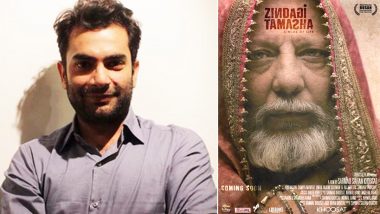Zindagi Tamasha being selected as Pakistan's official entry for the best international film at the 93rd Academy Awards following controversy against the movie came as a huge respite for the team, says Pakistani actor-filmmaker Sarmad Khoosat who calls himself a responsible director. The Lahore-set family drama faced trouble after the country's political party Tehreek-e-Labbaik Pakistan called for protests against its scheduled release on January 24, alleging it was "blasphemous". Deepa Mehta’s Funny Boy Rejected for Official Oscar Entry in the International Feature Film Category
Zindagi Tamasha, which premiered at the Busan International Film Festival last year, revolves around a patriarch (played by Arif Hassan) whose single act of self expression wrecks havoc on the lives of his immediate family. "In retrospect, it's funny how everybody would just say 'this doesn't happen in Pakistan'. We don't ban films. They do that in India! They have protests against films, they have extremist factions.' Oscars 2021: Academy Awards to Take Place on April 25, 2021 and the Ceremony Won’t Be Virtual
"There have been problems in Pakistan, they would massively censor or delete bits from films. The film banning business is not too fashionable here. This hit all of us quite badly," Khoosat, best known for TV show "Humsafar" and his feature directorial debut "Manto", told PTI in an interview over Zoom from Lahore. Despite being cleared by multiple censor boards twice, the film is yet to be released in Pakistan.
"The film got into trouble because some people seemed to have a problem with it on the speculation of what the film is about basing on the trailer. At one time 'I thought my country wants to disown the film, labelling it with all bad names'. But now it's going as an official submission from Pakistan, it is comes with a huge respite," the 41-year-old director added.
Unlike painting and sculpting, cinema is meant to be consumed by a larger audience and hence he makes sure his storytelling doesn't offend anyone, Khoosat said. "Most filmmakers come with a sense of responsibility. With this film, I was also being very sensitive, responsible. I know my context and region well. If I am talking about supposedly controversial, risque ideas, I was doing it very sensitively. The idea of my art is not to offend."
He said one also needs to understand the connotation of terms like "controversial" or "risque", adding it is up to creative people to change the perception of the audience. "Anytime you want to stay safe and distant from an idea, it's very easy to label it controversial...Objectively speaking, I don't know what qualifies as risque," Khoosat said. "Most of my work has been on television, which is heavily censored, I know how to tell stories. How much I can show or refrain from. Censor is not an external idea, it also exists here (mind). If it's about my style of storytelling, I would not like to be apologetic about it," the director, also known for shows like "Shehr-e-Zaat" and "Aakhri Station", added.
"Zindagi Tamasha" on Sunday will also bring down the curtains at the Engendered's I-View World Human Rights Film Festival, which started from December 10. The director, who also brought "Manto" to the film gala in 2016, said it was a "great honour" for him to come back to the festival even though virtually. "I remember the time I came with 'Manto' to I-View. It was the pre-pandemic era where we could meet, eat, and breathe carelessly..." he recalled.
Though there is no official ban, Pakistani artistes were barred from working in Indian film and music industry in the aftermath of the terror attack on an Army base in Uri in 2016. This prompted India to launch a surgical strike on terror launch pads in Pakistan. In the days that followed, actor Fawad Khan's role in Karan Johar's film "Ae Dil Hai Mushkil" was the centre of a storm and Bollywood producers have since avoided working with artistes from across the border. Khoosat hopes "Zindagi Tamasha" will resonate with the Indian audience as well.
"Films and stories are meant to be seen and heard. As many people can see them, hear them, that's the ultimate goal. Between us, India and Pakistan because of such shared history, heritage, empathy for things good and bad, it would be a tragedy if we would not be able to continue to exchange stories with each other." For an audio-visual medium like cinema, it would be a "tragedy" for a film to have a single theme to it, the director said, adding the overarching idea of "Zindagi Tamasha" is intolerance and acceptance.
"We all have become so anxious and agitated. Unnecessary kind of alertness and need to have an opinion, to react. That eventually would translate into a very intolerant behaviour. "On a personal and collective level as community, nation and family, somewhere the underlying and overarching idea is to reflect on that when we make a judgement or speak out our opinion, it needs to be a little more thought out as opposed to spitting it out," he said. Referring to television as his training ground, Khoosat, whose father Irfan Khoosat is a veteran actor-producer, said his heart always beat for the big screen.
Growing up, the director said he wanted to be part of cinema ever since he watched Bollywood superstar Madhuri Dixit-Nene dance to a song on his VCR. "As a child, I was more fascinated with cinema. TV soon became furniture like in every household. The shift (towards cinema) happened in 2017 post 'Humsafar'. I thought I need to buckle up and be in control. "It's also an age thing, 41. Now one needs to have a plan about dreams and start working towards them to make it happen. I started this company (Khoosat Films) where also began the journey of 'Zindagi Tamasha'."
(This is an unedited and auto-generated story from Syndicated News feed, LatestLY Staff may not have modified or edited the content body)













 Quickly
Quickly

















